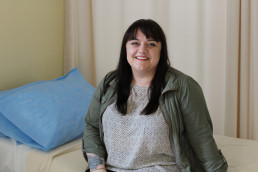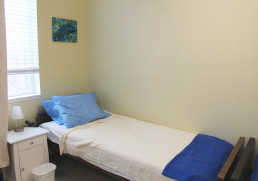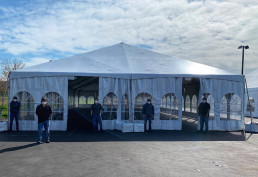
Recuperative Care: Helping homeless patients transition from emergency room to shelter
Imagine leaving the hospital after a surgery or a serious illness and having to recuperate in a bunk in a crowded homeless shelter dorm. How restful would your sleep be?
Or, imagine trying to heal in a tent, far from running water, a long walk from help or a prescription refill. Could you keep your dressings clean? Could you rest, knowing that you were unprotected in your sleep?
Nationwide, those who are homeless wind up re-hospitalized or in an emergency room much more frequently than do housed patients. And, according to The American Hospital Association, someone who’s homeless typically needs to stay in the hospital for two to four days longer than someone who is housed.
That’s not ideal for anyone—the patient, the healthcare system or anyone who needs health resources.

Thankfully, St. Joseph Health and Kaiser Permanente have joined with COTS to provide short-term recuperative care at our Mary Isaak Center. In a large, airy and light-filled second room floor, we can house six people while they heal. Each resident has a bed, dresser, and night table. And each can draw a curtain around his or her bed to get a little peace and privacy.
The most important part of the equation is Julia Dodge, our Lead Recuperative Care Coordinator. She helps those in the program make it to medical appointments and understand and follow-through on directions from their doctors.
Most importantly, she helps them plan for their futures.
It’s possible for our recuperative care residents to move right into the shelter once they’re on the mend. But, ideally, they’ll move to homes of their own. Julia helps them inventory their prospects. Can they work? Are they eligible for disability or retirement benefits? Can they stay with friends or family? What kind of housing situations can they afford? Do they need ongoing support to address a health condition?
For many of the people who stay in recuperative care, this is a rare opportunity for calm consideration. Being homeless means being busy lining up your next meal, your next shower, your next place to lay your head. And through it all, the constant question: “Am I safe here?”
Now, in Recuperative Care, safety is a given. So are shelter, showers, good food, laundry, access to computers and supportive help. Residents are also right next door to the satellite office of the Petaluma Health Center, so medical care is a given, too.
“We have amazing people staying here,” Julia says, “people who have had amazing lives, amazing experiences. They’re at a crossroads and we’re here to help them figure out where they want to go.”
Julia’s career started in journalism and marketing. Among many career highlights, she wrote for “San Francisco Magazine” and did the publicity for the Napa Valley Film Festival. “I think that did prepare me for this role,” she says. “It gave me the ability to research and to work independently and meet deadlines. You have to be organized, and you have to be able to listen.”
While volunteering for San Francisco nonprofit Health RIGHT 360, Julia realized she wanted to devote her next chapter to helping people move on from homelessness. Her volunteer work involved helping people without homes access treatment, services, medical care and housing. And she loved it.
Julia inaugurated the Recuperative Care program at COTS in January. She created guidelines for the program and she designed the space. She found soft sheets and blankets, restful artwork and lovely houseplants to make her residents feel welcome and at home. It’s too soon to draw conclusions about the program’s effectiveness in keeping people healthy and out of the hospital, but, Julia says, few have needed to visit the emergency room or be hospitalized. Additionally, so far, 75 percent of Julia’s Recuperative Care clients have gone on to permanent housing or a safe bed in our shelter.
She’s now doing double duty at the Mary Isaak Center. In order to comply with social distancing requirements, we’ve had to reduce the number of residents in the recuperative care room to three. So, Julia is filling in wherever needed.
Programs Director Jules Pelican says gratefully that Julia’s “made herself available for any and all tasks, no matter the size or context.” Most importantly, Julia’s been providing case management to some of our shelter clients so that they, too, can benefit from her skills and encouraging manner.
Now, during shelter in place, we are more glad than ever that we have the space and resources to help people heal and move forward with their lives. Many thanks to our partners, Kaiser Permanent and St. Joseph Health.
Special thanks to local artist Lucy Arnold who donated her original artwork to hang on our Recuperative Care walls. You can see more of her work at lucyarnold.com.

Business Gives Back
We love to talk about the contributions our local businesses make to COTS. And, boy, do they contribute!
But if there’s one thing this health crisis shows, it’s that we’re all in this together. We all benefit when a business gives to any great local cause. We all benefit when a business supports its employees—especially now.
For the next few weeks, we’re going to feature our business supporters. We’ll tell you about how they partner with COTS to help our clients find and keep housing. And we’ll also let you know how these businesses strengthen our entire community.
Thank you for supporting COTS! We hope you enjoy reading about our local business heroes who share your passion for our work.
We’ll start by featuring Bergin Screen Printing and Etching, and Encore Events. These are two businesses with deep community roots—roots that help an entire community bloom. Keep an eye on our web page and social media for these and more profiles in the next few weeks.